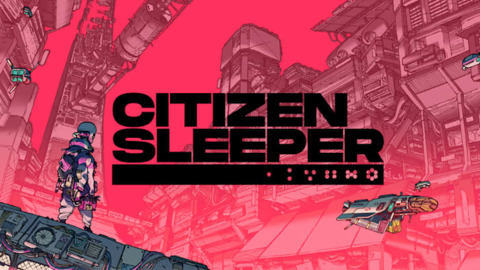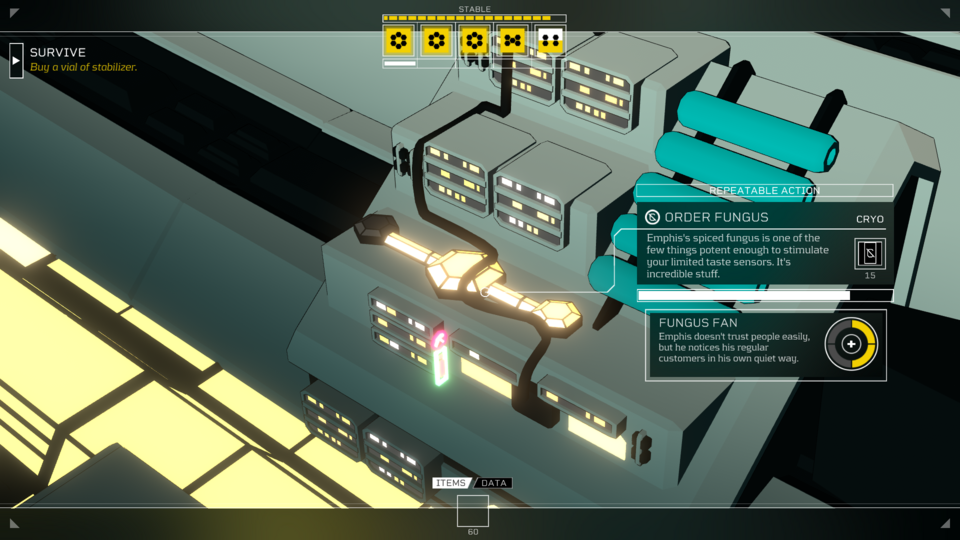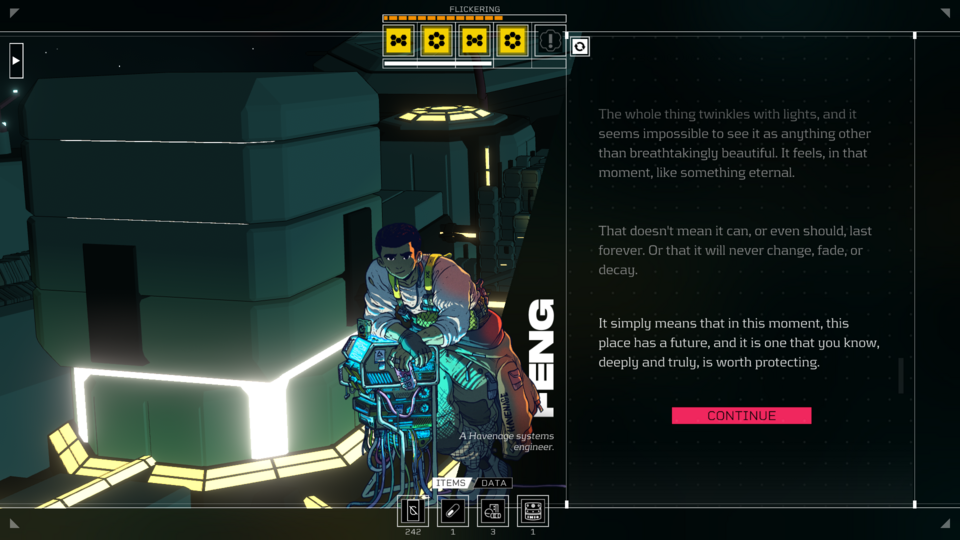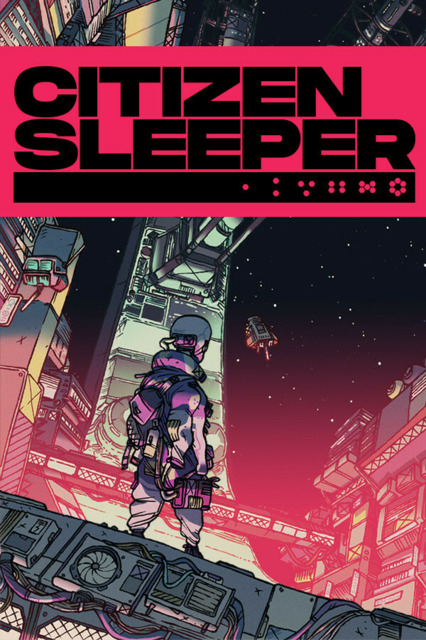
- Game: Jump Over the Age's Citizen Sleeper.
- Release Month: May.
- Quick Look: N/A.
- Started: 02/01.
- Completed: 03/01.
Citizen Sleeper was a really pleasant surprise. Prior to playing it, the only things I managed to pick up about it from general cultural osmosis beyond the themes was that it was one of those "hard decisions" type of adventure games, so beloved of Telltale and the like, of a corporate android slowly falling apart as they try to eke out a living on an orbital colony full of disparate and equally desperate souls. It sort of is that, but was a lot more accommodating than I anticipated and isn't so much trying to herd you towards one awful, morally-circumspect conclusion or another but inviting you to partake in a series of vignettes about locals whose lives you end up touching, for good or for bad, with some mild RPG mechanics to introduce a little bit of unpredictability.
So let's focus on that gameplay first, and save the juicy story stuff for later. Citizen Sleeper operates on cycles: every cycle you are given multiple dice rolls, resulting in the numbers from 1-6, the total number of dice being based on how full one of your two survival gauges happens to be, specifically your condition. As a robot with a transferred human consciousness you have a body that was purpose-built for planned obsolescence—your corporate owners' insurance for any of you that might try to escape their spacebound indentured servitude, like you did—and must figure out a way to get the life-saving medicine meant to stabilize the decay of your functions. In-game, failure to keep this bar topped up limits the number of actions you receive per cycle, greatly reducing your efficiency. Naturally, it's also one of the toughest and most expensive problems to fix and only temporarily, but not so tough that you can royally screw yourself over minutes into a playthrough. Your dice actions can be spent towards progressing various meters, the number on the die determining the likelihood of success: 6 guarantees a positive result, 5 an even split between positive and neutral (neutral still being good, just not as good as positive), 3-4 has a moderate chance of neutral and a small chance of either positive or negative, and 1-2 is an even split between neutral and negative. Negative results can often incur penalties to your condition or your energy (a relatively easier bar to keep full, since all you need to do to fill it is to eat or rest) depending on the riskiness of the action. Most cycles have you dropping what dice you have on the goals you're pursuing that moment, whether it's investigating parts of The Eye—the ring-like station you're on—or completing repeatable tasks for cryo (the game's currency, needed for most things), or helping out an NPC to further along one of the game's many character-focused side-quests. These quests, called Drives, will also confer building points when completed which you can put towards stats and perks: a higher stat means a bonus to any dice rolls spent on jobs that rely on that stat, like say the "Interface" stat for anything involving hacking or "Engage" for any social task. It's a lot to keep in mind but it all boils down to prioritizing tasks that seem the most important to your immediate survival first and then to NPC storylines you want to further second, and burning any bad dice on tasks where failure doesn't matter so much (or on hacking, which doesn't use the dice to determine success but rather asks for specific dice—usually low value ones—to complete the job).

Time management is also pivotal without being too demanding in Citizen Sleeper, as many quests rely on interstitial wait times between steps as do conditional things like visiting merchants. Given there are many times where an NPC you've been getting close to might need, say, six cycles before they're ready to give you the next objective, the game's sort of incentivizing you to keep exploring your options elsewhere. New areas of The Eye open up once you can afford the fares to reach them, first with the Lowend section where most of the poor people and criminals congregate and eventually with the Greenway section where the station grows most of its food. Burning a few dice to explore these areas in full means access to new vendors, new story NPCs, and new opportunities to earn money, find somewhere to eat, or a place to crash. Though you might find yourself spinning multiple plates at once with the options available to you, the game only does the time-sensitive thing a handful of times and it's usually safe to focus all your energy on whatever needs doing quickly as everything else can and will wait for you. Even the game's multiple endings are kind enough to dump you back on The Eye afterwards in case you had business to tie up elsewhere. The concerns I had about the game going in was a combination of dealing with decision anxiety and not being able to manage my time effectively, a la something like the strict schedule of a Persona game (that is, if you're trying to complete as many social links as possible), but Citizen Sleeper's unhurried approach seems to prefer you take your time, absorb the atmosphere, and read through a whole lot of very well-written sci-fi prose about transhumanism and how humanity's many issues with homelessness, migrant diasporas, wealth inequality, and becoming lost in the churn of administrative systems that focus more on the big picture than individuals aren't going to vanish in the space-faring age but if anything become even more pronounced. If the relatable people moments and politics of The Expanse appealed to you more than even the action, the realistic space travel, or the mysteries behind its blue alien goop, Citizen Sleeper is very much of the same mind.
What makes Citizen Sleeper tick are the NPCs you encounter and the stories you create alongside them. Life is more than mere survival after all, and through these connections you not only get a window into the wider world of this detailed near-future setting but a mixture of the warmth, sadness, gregariousness, despair, and hope that only other people can provide. As a sleeper, the titular android, you are treated with a lot of suspicion and pity by those you meet; everyone seems familiar with how your patron corporation, Essen-Arp, creates these sleepers to be expendable with limited lifespans (much like the Replicants of Blade Runner) and are thus not particularly eager to befriend a non-human simulated person falling apart in real-time, but there's a precious few that strike up a conversation and draw you into their lives. The kind if cautious salvage worker that first pulls you out of spaceship wreckage, a rebellious systems operator who recruits you to root out a conspiracy, a friendly bar owner looking to expand her business, a migrant worker and his young daughter looking for a new life on board a generational colony ship through a lottery program open to those who help finish its construction, and even the bounty hunter who is hired to return you to Essen-Arp all have their tales to tell and your roles to play in same, and seeing the way each plays out—most of them set in stone, though there's a few player-determined details where they might divert—is definitely the highlight of the game. Absolutely worth getting involved with as many people as possible as you play, both for the sake of seeing more of the game's writing and for the character development points on offer.

Since I skipped out on Disco Elysium (I still fully intend to play it someday) this is the first of these non-combat, narrative-focused RPGs I've encountered but I'm impressed with the format as a way to tell stories like an adventure game but still add the elements of randomness and good judgement that RPGs often bring to video game narratives, if not in the sense that your choices affects the story one way or the other then at least in the sense that you feel that you've helped put things into motion through your own efforts beyond simply replying "yes" or "no" to a prompt. It's also worth noting that the game has a super slick UI to it that elevates what is essentially a series of menus with a side-bar for dialogue, and an art style that—and I hope this doesn't come off as unkind—reminds me a lot of character doodles I would see folks make on their player character sheets when playing table-top games, which manage to be both simple and detailed in ways important to the artist. Between its beating heart and a fairly original premise and gameplay conceit, Citizen Sleeper might be one of the year's... I'm not going to say "sleeper hits" because I'm not that much of a hack, but certainly a surprising dark horse that will continue to find an appreciative audience as we edge closer to a rough-and-tumble corporate-owned future much like the one it presents.

Log in to comment